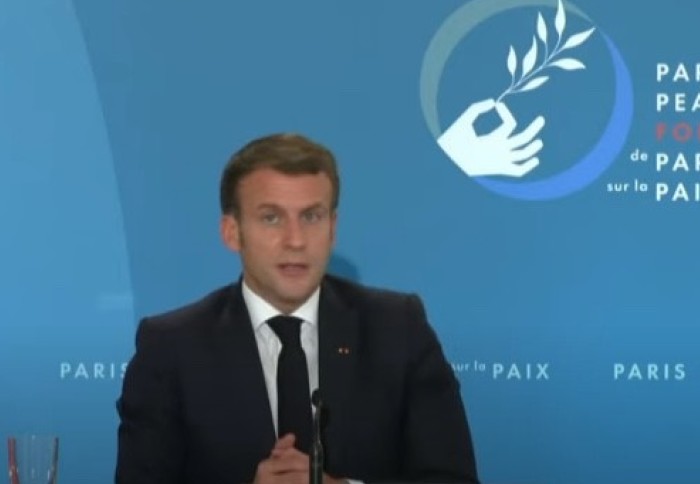Vaccines give us light at end of the tunnel, Neil Ferguson tells Paris Forum

Professor Neil Ferguson joined global leaders at the Paris Peace Forum. French President Emmanuel Macron pictured speaking at the event
Imperial’s Professor Neil Ferguson says that the promise of effective COVID-19 vaccines is very encouraging but we may need restrictions until then.
Professor Ferguson was speaking at the Paris Peace Forum, an international gathering of global leaders, CEOs of multinationals, world-renowned experts and NGOs.
Speaking ahead of French President, Emmanuel Macron, in a session about the global pandemic, Professor Ferguson said: “The promise of vaccines is very encouraging and gives us light at the end of the tunnel, but as we know even in high-income countries, it will be several months before significant amounts become available, so we have to sustain responses we have at the moment, which will involve difficult decisions.
“We have seen a degree of global cooperation in vaccines such as regional initiatives within the EU, but clearly we are going to see high-income countries get vaccines first, so I’m afraid a lot of the world will be waiting quite a long time to get large supplies of vaccines.”
Global response

Professor Ferguson, who is Director of the Abdul Latif Jameel Institute for Disease and Emergency Analytics (J- IDEA) and the MRC Centre for Global Infectious Disease Analysis, also spoke about the impact the pandemic was having across the world, and in higher income and lower income countries.
“The longer-term challenge is capacity to sustain interventions. It’s been much harder on LMIC countries than high-income countries." Professor Ferguson Director of J-IDEA and MRC-GIDA
Professor Ferguson said: “I think there are many lessons that are common to all countries regardless of development status.
“In developing countries there have been some examples of much more rapid and effective responses, such as countries in Africa locking down at the same time as Europe.
“The longer-term challenge is capacity to sustain interventions. It’s been much harder on LMIC countries than high-income countries.
“We work with many colleagues in Latin America, where initially lockdowns were put in place but they found it difficult to sustain, and the consequences have been a long and sustained, deadly epidemic.”
Professor Ferguson said that better cooperation between countries might reduce the impact of future pandemics.
Professor Ferguson said: “In some areas of the world, such as North America and Latin America, you have seen a diversity of responses and maybe less inter-state cooperation and coordination than would have been optimal.
“Countries will want to govern their own policies but I think more lessons could have been learned at an early stage.
“Across some LMIC countries there has been more coordination in multiple sectors, so it is a mixed picture.
“There is scope for us to reflect on how to put in place mechanisms that allow a more coordinated response globally to any similar infections disease while remembering that countries are autonomous.”
Imperial’s vaccine

Stephanie Morris, Director of Industry Partnerships and Commercialisation, Medicine at Imperial, also spoke at the Forum about Imperial’s social enterprise, VacEquity Global Health, which will deliver Imperial’s vaccine to the world.
Stephanie said: “In five months, this partnership has achieved what normally takes five years to do. We have moved rapidly from preclinical research to clinical studies, administering now to well over 400 people.
"We have also established a full manufacturing and supply chain using contract manufacturing organisations, providing lots of flexibility and lending itself to a distributed manufacturing model in the future’.
“This allows us to make the vaccine affordable and accessible to everyone around the globe.
“We very much support the government guidance of prioritising vulnerable populations to receive the vaccine first but also want to make sure it is available to low and middle income countries (LMICs) at affordable prices.”
Article supporters
Article text (excluding photos or graphics) © Imperial College London.
Photos and graphics subject to third party copyright used with permission or © Imperial College London.
Reporter
Stephen Johns
Communications Division